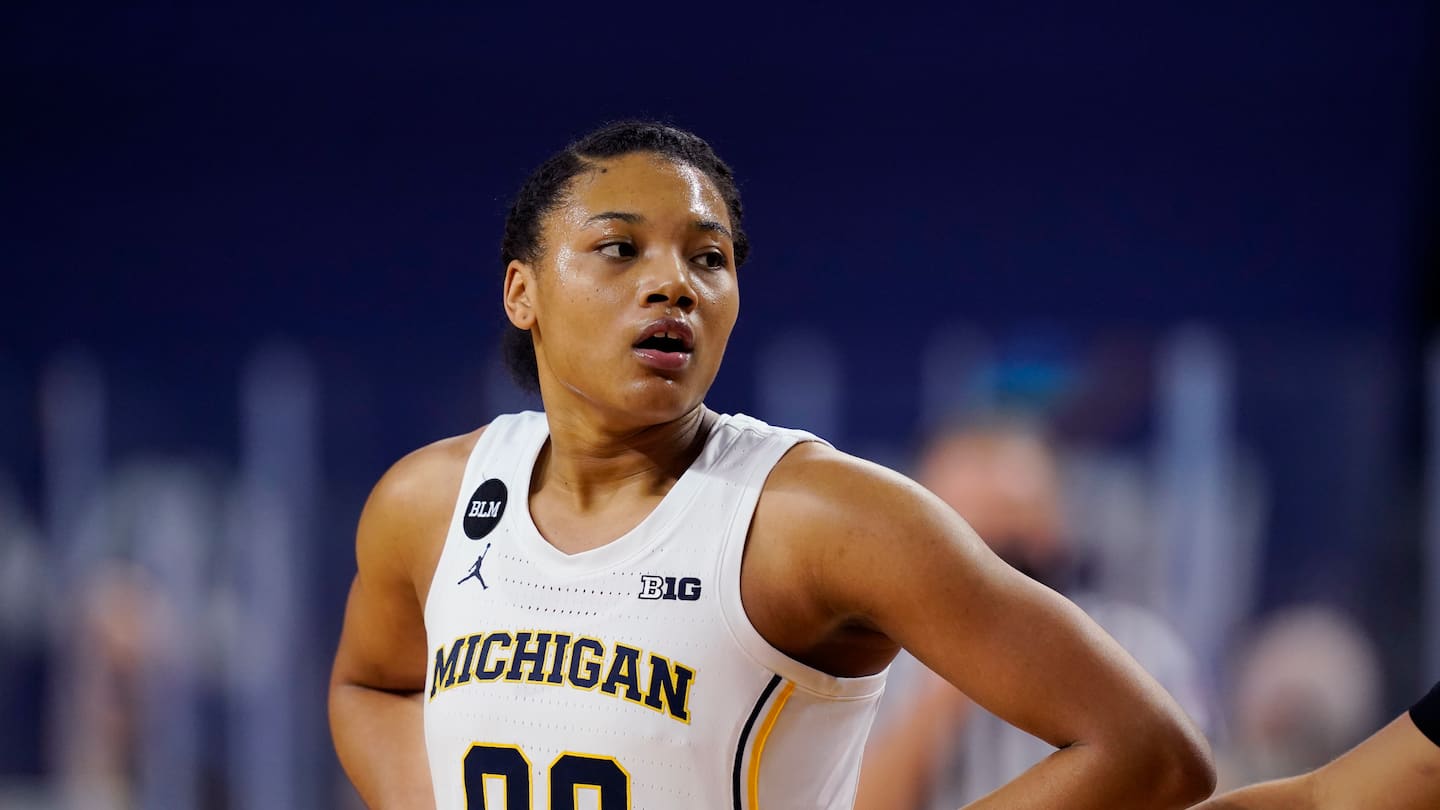Michigan’s Naz Hillmon knows all about inequity. Her mother and grandmother lived it.

But even as Michigan seeks to extend its breakthrough season, Hillmon remains mindful of the broader discussion that surfaced over the past week after video footage revealed the gaping disparity in equipment and amenities between the men’s and women’s weight rooms in each NCAA tournament bubble.
Gender inequity issues resonate in a profound way for Hillmon, a rare third-generation women’s basketball player. Her mother, NaSheema Anderson, played at Vanderbilt in the mid-1990s, and her maternal grandmother, Gail Williams, played at Bethune-Cookman two decades earlier before transferring to Cleveland State.
Hillmon has a deep understanding of what they endured and a profound respect for the groundwork they helped lay.
“It’s just such a difference because, during their times, no one was able to speak up about it,” Hillmon said during a telephone interview. “They didn’t have people backing them to say, ‘Speak up about what you believe in or what you think is unfair,’ but they’re doing that for us, and I think that’s huge.
“We all know in life and in sports having someone to back you is the greatest thing ever, and really going out there and understanding we’re not a second-tier part of the NCAA. We’re on the same level, and we should expect all the same things that men receive — in the NCAA, in life, at school — whether it be gender equality or [confronting] racial discrimination.”
Hillmon speaks at length with her mother on the best ways to make her voice resonate with the utmost conviction. Those conversations align with powerful messages from U.S. women’s soccer star Megan Rapinoe and other high-profile female athletes who are using their platform to push for swift and substantive change.
Anderson has shared with her daughter stories of the discrimination, both race- and gender-based, she faced while playing in the South. She also has told of how her salary in the American Basketball League compared with that of her brother, Jawad Williams, who played for 2005 national champion North Carolina and in the NBA with the Cleveland Cavaliers, the family’s hometown team.
The accounts have inspired Hillmon and given her a sense of mission to ensure more equitable circumstances for the next generation of female athletes.
“This has been a hot topic of conversation in our home for a long time,” Anderson said. “Just in the disparity when I was playing professionally and when my brother entered the NBA, just the disparities in compensation, and it has always been that way, and we’ve tried to empower Naz to speak her truth and to fight for equality, even at the high school level where there’s a difference between the male and the female athletes.”
She also has settled some family scores on the court. The 6-foot-2 junior had more than just a chance to make school history on her mind when the Wolverines faced No. 3 seed Tennessee in the second round Tuesday.
Anderson had been recruited by Tennessee when she was a high school all-American, but according to Anderson, Pat Summitt, the late Lady Vols legendary coach, intended to redshirt her as a freshman. Anderson took that as an affront and, after committing to Vanderbilt, used it as motivation every time the Commodores played Tennessee.
But over her four-year college career, Vanderbilt beat its archrival just once, when Anderson was a freshman on the way to winning the SEC tournament.
So when the bracket set up a second-round matchup between Michigan and the Lady Vols, Hillmon knew she had an opportunity. Her 19 points and a game-high 15 rebounds, including six offensive, helped the Wolverines to a 70-55 victory.
“She actually didn’t talk a lot about it [before the game],” Hillmon said. “And I think that’s her trying not to put pressure on me, but I’ve known forever that’s been a big rival. I remember she was always telling me how much she hated them and that she only beat then once as a freshman. She was really pumped about it.”
Hillmon and Anderson inherited their physical playing styles and penchants for rebounding from Williams, who prided herself on such attributes. Hillmon led the Big Ten in rebounding this season (11.6) and finished second in scoring (24.3); she did her best work in the painted area as a throwback post player, preferring to maneuver close to the rim rather than stray beyond the foul line. In a January loss to Ohio State, she became the first Michigan basketball player — for the men’s or women’s team — to score 50 points in a game.
Because of her long-standing commitment to her workout regimen and strong play inside, the weight room disparity was particularly galling. It left Williams shaken and remembering the nascent days of Title IX, when such inequities were commonplace.
“There’s a lot to be done, and I was very disappointed in what I saw,” Williams said of the viral video that Oregon’s Sedona Prince posted. “I had no idea. That was to me so disgusting. I know how much Naz puts into her being off the court as far as working out. For them to do that, it was really disgusting. I hope she becomes a part of that discussion, like: ‘What do we do to improve this?’ That’s unacceptable on so many levels.”






